

Gmail. The case against inquiry-based learning. Writing recently in The Irish Times, William Reville, emeritus professor of biochemistry at University College Cork, stated that newer teaching methods employed in the UK and Ireland are ‘sharply inferior to the older teaching methods they supplanted’.
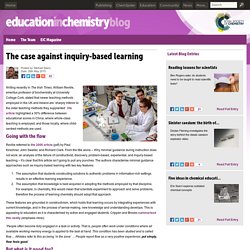
His article highlighted a 30% difference between educational scores in China, where whole-class teaching is employed, and those locally, where child-centred methods are used. Going with the flow Reville referred to the 2006 article (pdf) by Paul Kirschner, John Sweller, and Richard Clark. From the title alone – Why minimal guidance during instruction does not work: an analysis of the failure of constructivist, discovery, problem-based, experiential, and inquiry-based teaching – it’s clear that this article isn’t going to pull any punches. The authors characterise minimal guidance approaches such as inquiry-based learning with two key features: Summary notes on “Why minimal guidance during instruction does not work…”
As I noted in my previous entry, there is considerable disagreement over the efficacy of “student centered learning”, despite its popularity with the Twitterati.
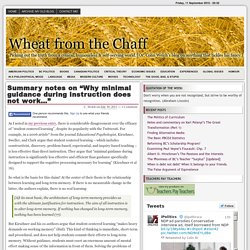
For example, in a 2006 article* from the journal Educational Psychologist, Kirschner, Sweller, and Clark argue that student centered learning – which includes constructivist, discovery, problem-based, experiential, and inquiry-based teaching – is less effective than direct instruction. They argue that “minimal guidance during instruction is significantly less effective and efficient than guidance specifically designed to support the cognitive processing necessary for learning” (Kirschner et al 76).
So what is the basis for this claim? At the center of their thesis is the relationship between learning and long-term memory. If there is no measurable change in the latter, the authors explain, there is no real learning: Kirschner’s article on minimally guided instruction. During Susan Ruff’s talk in the IBL Best Practices Session that Angie Hodge, Stan Yoshinobu, and I organized at MathFest, she made reference to an article by Kirschner, Sweller, and Clark.
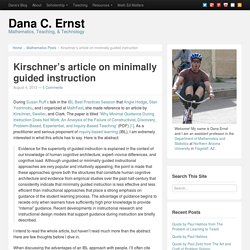
The paper is titled “Why Minimal Guidance During Instruction Does Not Work: An Analysis of the Failure of Constructivist, Discovery, Problem-Based, Experiential, and Inquiry-Based Teaching” (PDF) [1]. As a practitioner and serious proponent of inquiry-based learning (IBL), I am extremely interested in what this article has to say. Here is the abstract: Evidence for the superiority of guided instruction is explained in the context of our knowledge of human cognitive architecture, expert–novice differences, and cognitive load. I intend to read the whole article, but haven’t read much more than the abstract.
The Many Faces of Constructivist Discussion - GOLDING - 2009 - Educational Philosophy and Theory. What Teachers Need to Know About Teaching Methods - ACER Shop Online. The Pedagogical Orientations of South African Physical Sciences Teachers Towards Inquiry or Direct Instructional Approaches. Agora - Have we lost the plot?: Narrative, inquiry, good and evil in history pedagogy. Real world use of scientific concepts: Integrating situated cognition with explicit instruction. Inquirylearning.pdf. Kirschner_Sweller_Clark.pdf. Clark.pdf. How a Focus on Explicit Instruction is Transforming Teaching at Our High School. "I Do, We Do, You Do.
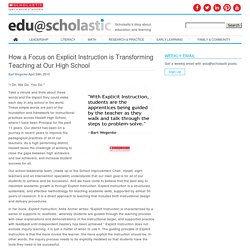
" Take a minute and think about these words and the impact they could make each day in any school in the world. These simple words are part of the foundation and framework for instructional practices across Haslett High School, where I have been Principal for the past 11 years. Crit_Thinking.pdf. 2003-Kalyuga_et_al.pdf. Ignore the fads: teachers should teach and students should listen. When imagining a teacher at work there’s a good chance you picture someone standing at the front of a classroom, explaining concepts and asking questions.
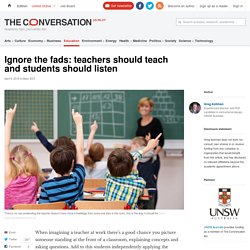
Add to this students independently applying the concepts with some corrective feedback from the teacher and you have a form of teaching known as “explicit instruction”. What is explicit instruction? The living city: Thirdspace and the contemporary geography curriculum. The Schools We Need. Core Knowledge 1/6. Cultural literacy abandoned for the here and now - The Drum. Opinion Posted Australia's national literacy and testing regime NAPLAN has been and gone for another year, and again critics have raised the usual complaints: standardised, high-risk tests unfairly stigmatise poorly performing schools and pressure teachers to teach to the test, and some schools exclude children who might drag down their results.
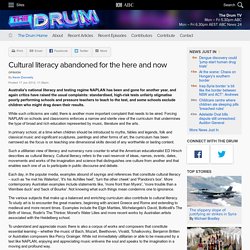
While such criticisms are valid, there is another more important complaint that needs to be aired. Forcing NAPLAN on schools and classrooms enforces a narrow and sterile view of the curriculum that undermines the type of broad and rich education represented by music, literature and the arts. In primary school, at a time when children should be introduced to myths, fables and legends, folk and classical music and significant sculptures, paintings and other forms of art, the curriculum has been narrowed as the focus is on teaching one dimensional skills devoid of any worthwhile or lasting content. Focus on education: Project-based learning often popular, but some question its value. Core Knowledge- Foundational Skills. Core Knowledge Testimonial. Schools and Museums: Goals for Students. This week, I am beginning the process of reflecting on the past 25 posts about field trips.
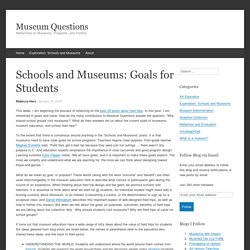
In this post, I am interested in goals and value: How do the many contributors to Museum Questions answer the question, “Why should school groups visit museums?” What do their answers tell us about the current state of museums, museum education, and school field trips? To the extent that there is consensus around anything in the “Schools and Museums” posts, it is that museums need to have clear goals for school programs.
Third space: When learning matters. Abstract: This is a comparative case study of ten schools serving economically disadvantaged communities, which integrated the arts across their curricula as a tool for school reform.
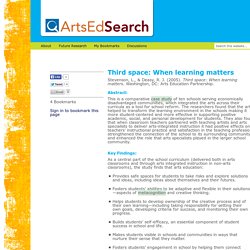
The researchers found that the arts helped to transform the learning environment in the schools making it more student-centered and more effective in supporting positive academic, social, and personal development for students. 05-Hull%20%26%20Moje%20CC%20Paper%20FINAL.pdf. Distinguishing knowledge-sharing, knowledge-construction, and knowledge-creation discourses. The study reported here sought to obtain the clear articulation of asynchronous computer-mediated discourse needed for Carl Bereiter and Marlene Scardamalia’s knowledge-creation model.
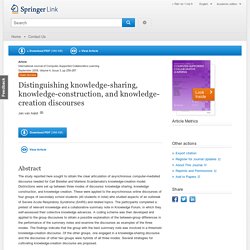
Distinctions were set up between three modes of discourse: knowledge sharing, knowledge construction, and knowledge creation. These were applied to the asynchronous online discourses of four groups of secondary school students (40 students in total) who studied aspects of an outbreak of Severe Acute Respiratory Syndrome (SARS) and related topics. The participants completed a pretest of relevant knowledge and a collaborative summary note in Knowledge Forum, in which they self-assessed their collective knowledge advances. A coding scheme was then developed and applied to the group discourses to obtain a possible explanation of the between-group differences in the performance of the summary notes and examine the discourses as examples of the three modes.
Keywords. Core Knowledge. Schneider vs. Hirsch: Is Core Knowledge Free…or Not? Mercedes Schneider, who teaches in a public high school in Louisiana and holds a Ph.D. in research methods, wrote a post about the transaction in which Rupert Murdoch’s Amplify bought the rights to Core Knowledge ELA for 20 years.
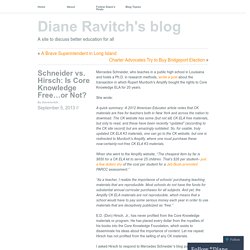
She wrote: A quick summary: A 2012 American Educator article notes that CK materials are free for teachers both in New York and across the nation to download. The CK website has some (but not all) CK ELA free materials, but only to read, and these have been recently “updated” (according to the CK site record) but are amazingly outdated. Interdisciplinary Project-Based Learning Leads to Success. The resource you are accessing has been identified as secure content. This site is currently verifying your digital identity. For most web browsers this process is automatic, you will be taken to your original resource upon completion. The verification process is encrypted to protect your digital identity. Instruction in High Schools: The Evidence and the Challenge. The resource you are accessing has been identified as secure content.
This site is currently verifying your digital identity. For most web browsers this process is automatic, you will be taken to your original resource upon completion. The verification process is encrypted to protect your digital identity. The verification process should take no more than 20 seconds to complete. The verification process is required only once per session for each unique site you visit.
"There Is Knowledge to Be Gained" The resource you are accessing has been identified as secure content. This site is currently verifying your digital identity. For most web browsers this process is automatic, you will be taken to your original resource upon completion. Disjuncture, Design, and Disruption: Bridging the gap between students' everyday and academic knowledge through historical inquiry. The resource you are accessing has been identified as secure content.
This site is currently verifying your digital identity. For most web browsers this process is automatic, you will be taken to your original resource upon completion. The verification process is encrypted to protect your digital identity. The verification process should take no more than 20 seconds to complete. Building student knowledge: A study of project-based learning to aid geography concept recall. The resource you are accessing has been identified as secure content.
This site is currently verifying your digital identity. For most web browsers this process is automatic, you will be taken to your original resource upon completion. The verification process is encrypted to protect your digital identity. Teacher Attitudes Toward the Use of Problem-based Learning in Science Courses with State-mandated, End of Course Testing.
ESOE secure resource verification. ESOE secure resource verification. ESOE secure resource verification. ESOE secure resource verification. ESOE secure resource verification. Dumb Ideas Won't Create Smart Kids: Straight Talk About Bad School Reform ... - Eric M. Hass, Gustavo E. Fischman, Joe Brewer. ED522271.pdf. ImprvStdntLrng4Web.pdf. Special Education and School Reform in the United States and Britain. Show Me the Evidence! Proven and Promising Programs for America's Schools., 1998. Viewcontent. "Outcomes-Based Education and the Death of Knowledge" by Richard G. Berlach. Core Knowledge® Foundation : E. D. Hirsch, Jr. International Journal of Innovation in Science and Mathematics Education (formerly CAL-laborate International) International Journal of Innovation in Science and Mathematics Education (formerly CAL-laborate International)
Transforming Education. ED-No-Shortcuts.pdf. Viewcontent. Media.proquest. Brokes Dissertation 4-23 -2010 TI-Nspire TI-84. Viewcontent. Ontheroad.pdf. Canada%2021st%20cent%20learning.pdf. Problem loading page. 03043790701520792# ‘Wicked Problems’ and the Work of the School. Viewcontent. Knowledge building and vocabulary growth over two years, Grades 3 and 4. Access - Using guided inquiry in a Year 3 classroom. Guided Inquiry Design: A Framework for Inquiry in Your School - Carol C. Kuhlthau, Leslie K. Maniotes, Ann K. Caspari. Schoolwide-reform-models.pdf. School Library Management. School Library Management. CI%20K~%20389.pdf.
Backers%20of%2021st%20Century%20Skills%20Take%20Flak.pdf. Ten questions that will improve your teaching, school or district. E.D. Hirsch, Jr., Replies to Randall Hendee. Community-based-learning.pdf. Inquiry-based Learning: Explanation. Oecdbuch.pdf. Fluff and Nonsense - Teacher in a Strange Land. Klemm.pdf. Old Whine, New Bottle. Social Justice and Knowledge. EDHirsch-Report-Papers-Final. Will They Know Enough?: Pre-Service Primary Teachers’ Knowledge Base For Teaching Integrated Social Sciences. What Is Core Knowledge? Lunenburg,%20Fred%20C.%20Theorizing%20about%20Curriculum%20%20IJSAID%20V13%20N1%202011.pdf. Chap6.pdf. GI-School-Librarians-in-the-21-Century.pdf.